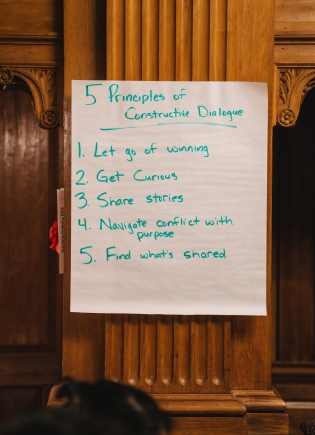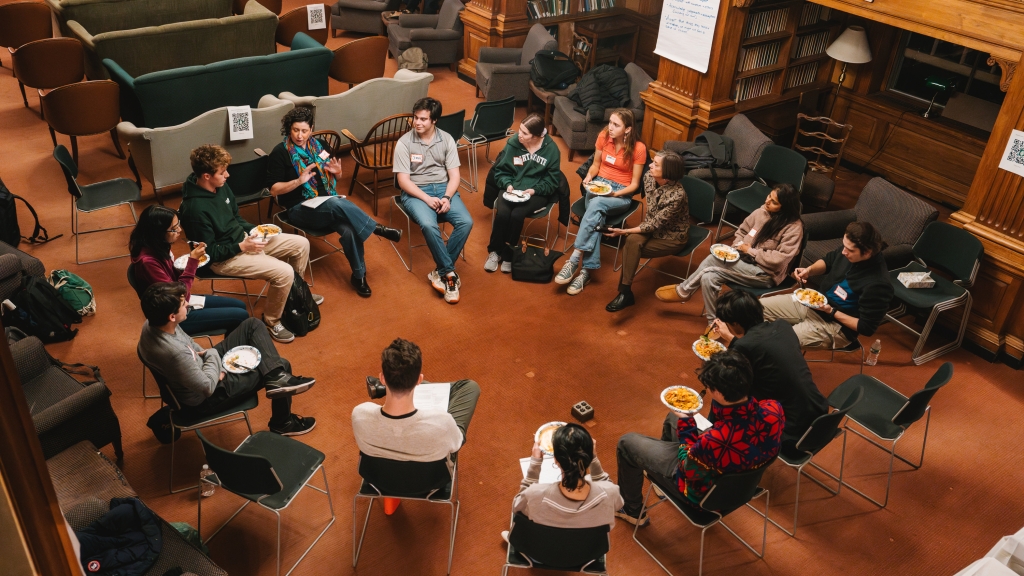As Thanksgiving break approaches, some may find the prospect of reuniting with family and friends both delightful and daunting.
Last week, to help students handle hot-potato topics as they pass the turkey and trimmings, Kristi Clemens teamed up with Cole Johnston to give a workshop in what they called "deep listening" and "constructive conversation."
Clemens is the executive director of the Dialogue Project, and Johnston manages student programs for StoryCorps, the nonprofit organization that records and preserves people's stories,
As they laid out a buffet supper and set up chairs in a circle in Sanborn Library, Clemens and Johnston agreed that holiday meals can be high-stakes events, especially for newly enrolled college students who may be encountering new ideas and forming views not shared by family members. And, said Johnston, the recent election could put political differences in stark relief.
"In the current moment, at least from my point of view, students need to be prepared to connect with perspectives with which they don't agree. I think that's very challenging and doesn't come naturally. It's not built into our culture," Johnston said.
After a dozen participants settled into their seats and introduced themselves, Clemens passed around index cards and asked participants to write their hopes about homecomings on one side of each card, and their fears on the other.
Many students hoped to renew close ties with friends and families, but there were worries, too, about losing or breaking those connections. "I fear harsh fighting, storming out, stress, discomfort, and not being able to coexist easily," one student wrote.
So how to head off or defuse angry or hurtful conversations? Listen closely to and affirm aloud the statements and beliefs of another person before jumping into the fray, suggested Johnston.
Students practiced those skills by listening to audio samples from StoryCorps' One Small Step initiative at Dartmouth, which brings together people who hold widely differing views and opinions. They then summarized, with empathy and understanding, what each speaker said.

A list of principles for having a constructive dialogue includes finding something that is shared and getting curious. (Photo By Robert Gill)
In a similar exercise, they were asked to identify sometimes complex emotions that seemed to underlie the stories people told about themselves.
But, asked one student, what if, despite your best efforts, you can't find consensus with someone who spurns open dialogue, or who is rude or deeply disrespectful?
"I do think that when you're talking with somebody who might be deeply opposed to your existence as a human, that might be a space where you're not able to engage with them, because it feels harmful or unhelpful," Clemens replied. "Is it worth it for you to continue to try to make that connection? Or is it just going to be somebody that you don't talk about those things with?"
As the session wrapped up, students passed around a microphone to record what they will be thinking and feeling as they leave campus next week.
"I usually try to stray away from politics in conversations with people, but this has made me inquire as to whether I can maybe discuss politics with people as long as it's done in a helpful, healthful, orchestrated way, and as long as I'm not pushing for an outcome or an understanding of my point of view, but just to understand their view," said Trey Barton '27.
Darci Rochkind '28 said she's been thinking a lot lately about how people talk with each other.
"Having a conversation about these things makes me think about, oh, do I want this person to feel this way when I speak to them? What do I value about this person? How can I bring out the best in that person?"
"It takes some courage to navigate through conflict in a way that is constructive," added Charlotte MacAvoy '28.
For Clemens, workshops like this one reinforce her faith in the ability of Gen Z to engage in meaningful, candid dialogue across differences and generations.
Johnston agrees.
"There's this perception of college students as being very one-dimensional, locked in, not thoughtful. And I'm thinking about how this experience I've had tonight flies in the face of some of those false narratives," he said. "I really appreciated everything that everybody brought tonight."
